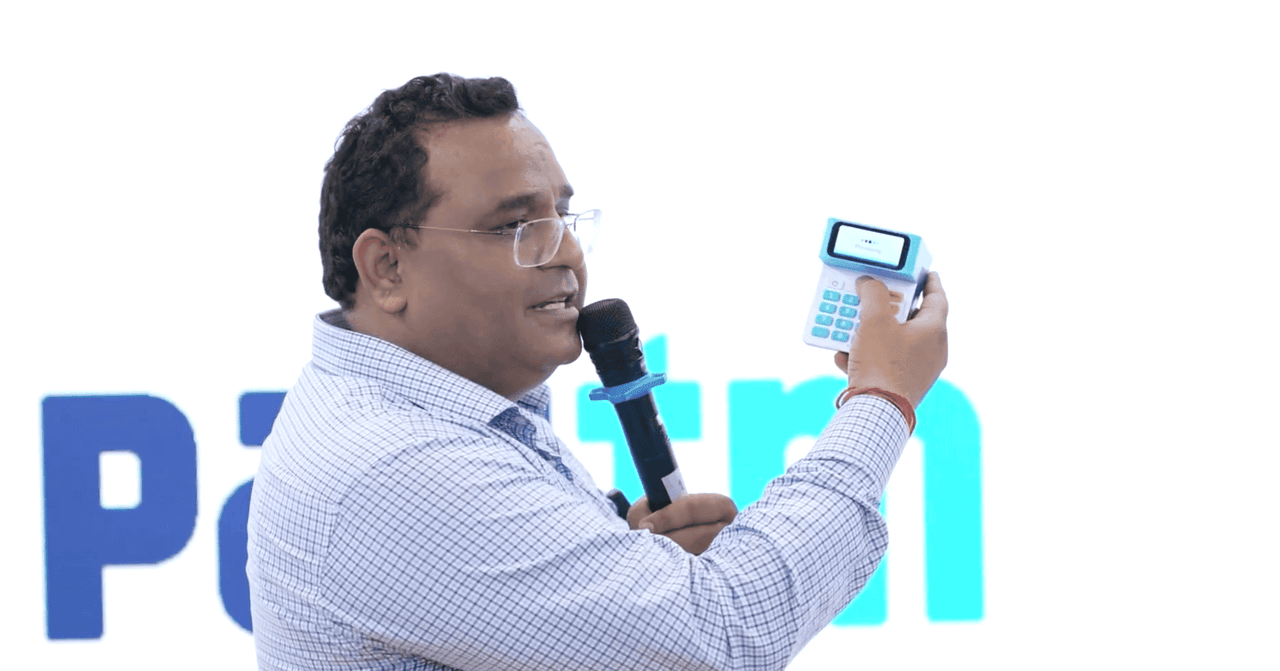Paytm's AI-First Transformation: Vijay Shekhar Sharma's Vision for India's AI Future
2 Sources
2 Sources
[1]
Paytm to become an AI-first company: Founder Vijay Shekhar Sharma - The Economic Times
Sharma said that as most jobs done by humans will be done by AI, the focus should be on building core products. He added that the goal for Paytm is to go beyond a fintech and become an AI-first company.Paytm founder Vijay Shekhar Sharma said the impact of artificial intelligence (AI) on jobs is inevitable as it has to be incorporated into routine workflows. "Sooner or later we will have to start using AI as an employee or even as a CFO," he said. Sharma said that as most jobs done by humans will be done by AI, the focus should be on building core products. He added that the goal for Paytm is to go beyond a fintech and become an AI-first company. While it will automate many human processes, AI is also going to create new job roles, Sharma added. ET reported last month that One97 Communications, the owner of Paytm, is laying off an undisclosed number of employees. Wider layoffs On a quarter-on-quarter basis, Paytm's sales team headcount dropped by about 3,500 in the March 2024 quarter to 36,521 personnel, mainly due to the impact of the Reserve Bank of India's ban on the services of Paytm Payments Bank. Paytm reported a consolidated net loss of Rs 540 crore in Q4 FY25 versus Rs 550 crore in the year ago period. ET also reported on Thursday that Paytm was a distant third in the UPI rankings in June, with 1.27 billion transactions worth Rs 1.34 lakh crore, accounting for 6.9% volume and 5.6% value. PhonePe led the charts with 8.55 billion transactions and a total value of Rs 11.99 lakh crore. The AI pilot The Paytm founder announced plans to pilot an AI-powered passbook that would send users a rap song of their monthly expenditure. He was speaking at Shiprocket's Shivir, AI Commerce Edition: Made for Bharat, on Friday, in New Delhi. No timeline has been disclosed but Sharma said it would be accessible to customers soon. He added that the product will use Paytm's data to develop tunes. Earlier, Paytm had partnered with AI startup Perplexity to integrate AI-powered search into its app.
[2]
India Should Position Itself As AI Use Case Capital: Vijay Shekhar Sharma
Sharma also said that many human-led tasks would eventually be performed by AI, adding that companies may even start using AI as an employee or even as a CFO Reflecting on India's position in the global AI race, Paytm founder Vijay Shekhar Sharma has said that the country should position itself as the "AI use case capital" rather than focusing on building foundational AI models like large language models (LLMs), given the high costs and infrastructure limitations. As per an Outlook report, Sharma said this while addressing Shiprocket's SHIVIR 2025: AI Commerce Edition - Made for Bharat in New Delhi today. Flagging the high entry costs and lack of global infrastructure, Sharma said, "I always wanted India to have our own AI. The sadness is that the entry ticket of an employee is $100 Mn which is completely routed from here." Notably, India continues to trail the US and China in AI research spending, access to high-end hardware (such as GPUs), and availability of top-tier AI talent, despite capacity-building efforts like the government's IndiaAI Mission, which has a corpus of INR 10,300 Cr. Sharma also pointed out the disparity in access to capital and globally competitive talent as key challenges for India in the AI space. Even if building large foundational models remains out of reach, he suggested that India could still make a mark by focusing on small language models and localised applications. He believes that India has the potential to lead in building highly relevant, use-case-driven AI models tailored to local needs. On the company front, Sharma shared his vision to transform Paytm from a fintech company into an "AI-first" company. He revealed that Paytm is actively piloting AI-powered products and has begun partnering with major AI players. While an ET report said that Sharma plans to pilot an AI-powered passbook that would send users a rap song of their monthly expenditure, the company has already partnered with Perplexity to integrate AI-powered search into its app earlier in February. With its partnership with Perplexity, Paytm plans to offer AI-driven intelligence in mobile payments. The company is also adding an AI-powered search bar in its app, enabling users to ask questions and make financial decisions. "Today, we are trying to learn what people are asking so that we can build a product in that direction. Some of the things you can soon expect us to launch include AI-first experiences in the app, which wouldn't have been possible without a model running behind the scenes to answer those questions," Sharma said in February. Sharma, at SHIVIR, also acknowledged that AI's impact on jobs is inevitable, as it becomes integrated into everyday workflows. He said that many human-led tasks would eventually be performed by AI, adding that companies may even start using AI as an employee or even as a CFO. His comments come at a time when Paytm is inching closer to profitability. In Q4 FY25, the company posted a consolidated net loss of INR 544.6 Cr. However, excluding an exceptional loss of INR 522.1 Cr incurred during the quarter, Paytm would have reported a loss before tax of only INR 19.9 Cr. Its operating revenue dipped 19% YoY but rose 5% QoQ to INR 1,911.5 Cr in the same quarter. Even in the UPI space, Paytm retained its position as the third-largest player after PhonePe and Google Pay in May, with a nearly 7% market share and 125.75 Cr UPI transactions worth INR 1.38 Lakh Cr during the month. In terms of its stock market performance, after the RBI's crackdown on Paytm Payments Bank, which raised concerns over the company's compliance and business continuity, its shares plunged to an all-time low of INR 377 on June 12 last year. However, the company managed to stage a turnaround. By December 2024, Paytm shares had hit a 52-week high of INR 1,062.95. On a YTD basis, the stock has given a negative return of 4.40% against the Sensex's positive return of 5.09% for the given period.
Share
Share
Copy Link
Paytm founder Vijay Shekhar Sharma outlines plans to transform the company into an AI-first entity and shares his vision for India's role in the global AI landscape.
Paytm's AI-First Transformation
Vijay Shekhar Sharma, founder of Paytm, has announced the company's ambitious plan to evolve from a fintech entity into an "AI-first" company. This strategic shift comes as Paytm actively pilots AI-powered products and forges partnerships with major AI players. Sharma emphasized that the goal for Paytm is to go beyond fintech and become an AI-first company, stating, "Sooner or later we will have to start using AI as an employee or even as a CFO"
1
.
Source: ET
One of the innovative AI initiatives in the pipeline is an AI-powered passbook that would generate a rap song summarizing users' monthly expenditures. While no specific timeline has been disclosed, Sharma assured that this feature would be accessible to customers soon, leveraging Paytm's extensive data to develop personalized tunes
1
.India's Role in the Global AI Landscape
Addressing India's position in the global AI race, Sharma proposed that the country should position itself as the "AI use case capital" rather than focusing on building foundational AI models like large language models (LLMs). He cited high costs and infrastructure limitations as significant barriers to competing in the development of large-scale AI models
2
.Sharma highlighted the challenges faced by India in the AI space, including:
- High entry costs, with an estimated $100 million required per AI researcher
- Lack of global infrastructure
- Disparity in access to capital
- Limited availability of globally competitive talent
Despite these obstacles, Sharma believes India can make its mark by concentrating on small language models and localized applications tailored to specific needs
2
.AI's Impact on Employment and Industry
The integration of AI into routine workflows is expected to have a significant impact on jobs across various sectors. Sharma predicts that many tasks currently performed by humans will eventually be taken over by AI. However, he also noted that while AI will automate many human processes, it is likely to create new job roles as well
1
.Related Stories
Paytm's AI Initiatives and Financial Performance

Source: Inc42
Paytm has already taken steps towards its AI-first vision:
- Partnership with AI startup Perplexity to integrate AI-powered search into its app
- Plans to offer AI-driven intelligence in mobile payments
- Addition of an AI-powered search bar in the Paytm app, enabling users to ask questions and make financial decisions
2
Despite recent challenges, including layoffs and regulatory issues with Paytm Payments Bank, the company has shown resilience:
- In Q4 FY25, Paytm reported a consolidated net loss of Rs 540 crore, a slight improvement from Rs 550 crore in the previous year
- The company retained its position as the third-largest UPI player in India, with a 7% market share and 125.75 crore UPI transactions worth Rs 1.38 lakh crore in May
2
The Road Ahead
As Paytm navigates its transformation into an AI-first company, it faces both opportunities and challenges. The company's ability to leverage AI technologies while addressing regulatory concerns and market competition will be crucial in determining its future success in the rapidly evolving fintech and AI landscapes.
References
Summarized by
Navi
Related Stories
Recent Highlights
1
Samsung unveils Galaxy S26 lineup with Privacy Display tech and expanded AI capabilities
Technology

2
Anthropic refuses Pentagon's ultimatum over AI use in mass surveillance and autonomous weapons
Policy and Regulation

3
AI models deploy nuclear weapons in 95% of war games, raising alarm over military use
Science and Research








